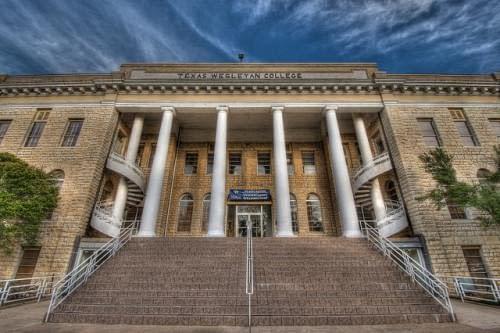Texas Wesleyan President Frederick Slabach said Tuesday that there is a two percent merit-based raise pool in the budget for the next year fiscal year.
Speaking at a 2020 Town Hall Meeting at the Baker Building, Slabach said Wesleyan tried to approve a three percent pool, but that the university’s budget is tied directly to enrollment.
“We’re projecting a decrease in enrollment next year, due to a smaller number of international students,” Slabach said.
Slabach said the decreased enrollment is because many international students that came to Wesleyan three years ago are now graduating; there has however been an increase in enrollment of American students.
“Plus we made a conscious decision for this coming fall not to recruit in two particular countries, because the experience we had with the students that were coming here is that they were only staying a semester,” Slabach said.
Slabach said he anticipates that the combination of international students graduating and fewer international students coming in will cost the university 3,000 credit hours next year.
Michael Greer, the Academic Success Center director, spoke before Slabach about academic distinction in academic advising and the center.
Greer said academic advising and the center have been working on aligning with the 2020 Academic Distinction goal.
“The 2020 Academic Distinction has four goals underneath it and the one that we’re focusing on is how are we offering accessible learning services and resources that support student learning outcomes,” Greer said.
Greer said the other three goals relate more to career and faculty, but this one relates directly to academic advising and the Academic Success Center.
“We’ve had 613 students come to our academic skills workshops, we’ve offered 60 workshops, we now tutor 44 courses, we started out as math and writing only and then we realized we needed to add a few other things,” Greer said.
Greer said that after Kelly Anderson, coordinator of tutoring and academic support, began working for the Academic Resource Center, the center was able to narrow down the subject students need the most help with.
Greer said she teaches Ram Rebound, an academic recovery course for any student who has less than a 2.0 GPA, which is now required so that the center can help get struggling students back to a good academic standing.
“I’ve found that having them in a captured classroom works better than just calling them into my office and trying to help them,” Greer said. “I also call in every student who has two or more deficient mid-term grades every semester.”
Greer said the center has worked hard to align its objectives with the 2020 Vision and make measurable goals to demonstrate what works and what needs improvement.
Greer said the center is going into year four of Advancement Via Individual Determination, a program that started in middle schools and high schools to prepare students for college and is now branching into higher education.
“We are one of only a few intuitions in the country that is AVID certified, which is also by the way helping with admissions,” Greer said.
Greer said that Anderson has really tried to engage the students by offering events like trivia and study skills blogs, which have been very successful.
Anderson said all the center’s tutors are AVID, which means that they go through a series of questions to help promote problem solving.
“All the tutors go through very intensive training,” Anderson said. “It’s about 12 hours across the course of the year and it’s dictated by AVID standards so it’s pretty set as far as what they learn each semester.”









![Pippin, played by Hunter Heart, leads a musical number in the second act of the musical. [Photo courtesy Kris Ikejiri]](https://therambler.org/wp-content/uploads/2025/04/Pippin-Review-1200x800.jpg)
![Harriet and Warren, played by Trinity Chenault and Trent Cole, embrace in a hug [Photo courtesy Lauren Hunt]](https://therambler.org/wp-content/uploads/2025/02/lettersfromthelibrary_01-1200x800.jpg)
![Samantha Barragan celebrates following victory in a bout. [Photo courtesy Tu Pha]](https://therambler.org/wp-content/uploads/2025/05/20250504_164435000_iOS-834x1200.jpg)





![Hunter Heart (center), the play's lead, rehearses a scene alongside other student actors. [Photo courtesy Jacob Sanchez]](https://therambler.org/wp-content/uploads/2025/04/thumbnail_IMG_8412-1200x816.jpg)
![Student actors rehearse for Pippin, Theatre Wesleyan's upcoming musical. [Photo courtesy Jacob Rivera-Sanchez]](https://therambler.org/wp-content/uploads/2025/04/Pippin-Preview-1200x739.jpg)
![[Photo courtesy Brooklyn Rowe]](https://therambler.org/wp-content/uploads/2025/05/CMYK_Shaiza_4227-1080x1200.jpg)

![Lady Rams softball wraps up weekend against Nelson Lions with a victory [6 – 1]](https://therambler.org/wp-content/uploads/2025/04/Screenshot-2025-04-04-100924-1200x647.png)
















